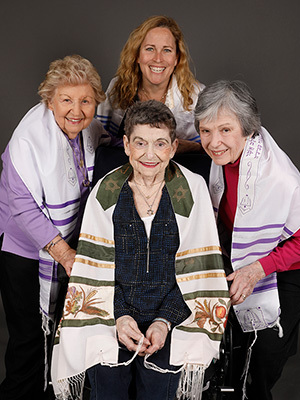A Milestone for the Ages


A Milestone for the Ages
The Jewish Home is a destination for Los Angeles-area seniors—an environment offering warmth, caring, compassion, and safety. For many seniors, including Edith Frankie, Linda Frankes, and Mildred Moccio, it is also a point of embarkation: a place from which to set out on exciting journeys of growth and self-discovery. In June, all three women celebrated their adult bat mitzvahs at the Home, culminating a period of intensive preparation and personal exploration.
It was Edith, recalls Rabbi Karen Bender, the Home's Skirball Director of Spiritual Life for the Home's Grancell Village campus, who provided the initial inspiration for the bat mitzvah event. "Edith is a Holocaust survivor, and she had sponsored an honorary bat mitzvah for her six-year-old sister, who never made it out of the camps," Rabbi Bender says. "One day, I suggested she consider having her own bat mitzvah, and she quickly embraced the idea."

From there, Edith picks up the narrative. "I was worried at first because I don't read Hebrew, but Rabbi Bender was very encouraging about how I could learn," she says. "I thought, ‘What a terrific way to get revenge on Hitler: to deepen my understanding of Jewish history and culture!'"
Once Edith was on board, Rabbi Bender extended the offer to her Jewish Home congregants at large. Linda and Mildred stepped up immediately.
"I've always had a deep interest in Judaism, but I grew up during a time when girls were less involved in Jewish religious life, plus my family lived far away from the closest Jewish community," Linda notes. "Now that I'm at the Home, I have time to do what I want to do, and I decided to join Rabbi Bender, Edith, and Mildred every week to learn. It was absolutely wonderful."
Mildred's path to the bimah was different. Earlier this year, at 82 years old, she converted to Judaism from her native Catholic faith in a Jewish Home ceremony led by Rabbi Bender. Her daughter had converted decades earlier, and Mildred ultimately felt the same call. "It took me 82 years to move closer to God, but Judaism has changed my life and way of thinking," she says. With the conversion behind her, she set her sights on a new horizon: gaining something else in common with her 22-year-old granddaughter Payton, who was raised Jewish and had a bat mitzvah at the age of 13.
"My mom and my daughter share an incredible connection, and my mom actually took Payton's Hebrew name during her conversion," says Debbie Doll Breindel, Mildred's daughter. "Now with the bat mitzvah, this whole set of experiences has been so amazing for both of them. I'm incredibly grateful to the Jewish Home for making it possible. My mom living there has been the best thing that's happened to our family."
Edith's son Richard is equally effusive. "My mom has a smile that is always shining, both on her face and in her heart," he says. "Even though she moved into the Home right when she lost my dad—the love of her life for 65 years—and didn't know anyone else, she quickly embraced her life there and started attending services every Friday night and Saturday morning. Her bat mitzvah at the Home is a remarkable accomplishment my wife and I will always treasure, and one that I know my dad would have loved to see."
Edith, Linda, and Mildred's admirers extend well beyond their immediate families. "It was a privilege to attend the b'not mitzvah of these very special Jewish Home residents," says Andrew Berman, chair of the Home's board of directors. "I'm thrilled they were able to experience the joy and fulfillment of this monumental event at this stage of their extraordinary lives."
The women each received a tallit for the occasion, and they wrote divrei torahs (brief commentaries on the weekly Torah portion) to give during the service. Their speeches reflected the insights they gleaned during five months of dedicated study with Rabbi Bender.
"The learning process was so rewarding for these women, and for me," Rabbi Bender says. "It was very touching, and a great honor, to shepherd them through this process. These are people who would probably never have done this in any other setting, but because they're at the Jewish Home, they had the opportunity. It's just incredible."
Rabbi Bender points out that, in addition to engaging in a life-affirming act for themselves, Edith, Linda, and Mildred have also helped blaze a trail for other seniors like them. "The moral of this story is that you can keep stretching and growing at any age," she says. "It's never too late to learn something new."